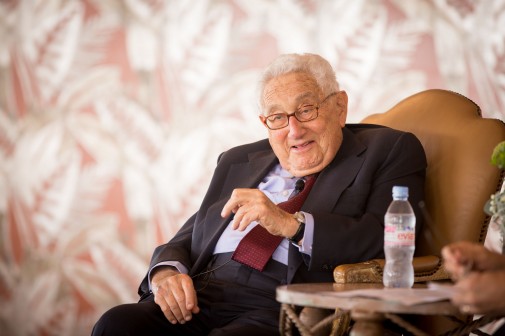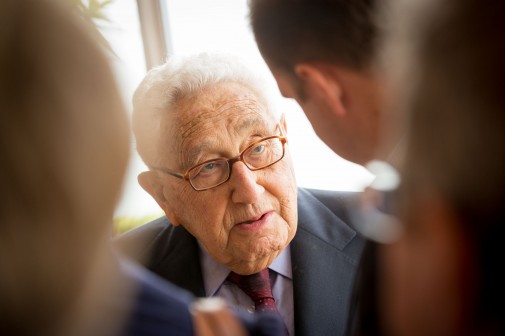Kissinger Dissects U.S. Foreign Policy
By
Westmont
 Henry Kissinger entertained dozens of foreign policy questions submitted in writing by about 100 guests at a Westmont-sponsored luncheon Oct. 9 at the Coral Casino Beach and Cabana Club. Kissinger shared insights into the agreement by Russia and the U.S. to rid Syria of chemical weapons as well as Iran’s capability to use nuclear weapons.
Henry Kissinger entertained dozens of foreign policy questions submitted in writing by about 100 guests at a Westmont-sponsored luncheon Oct. 9 at the Coral Casino Beach and Cabana Club. Kissinger shared insights into the agreement by Russia and the U.S. to rid Syria of chemical weapons as well as Iran’s capability to use nuclear weapons.
Kissinger, who served as both national security adviser or secretary of state from 1969-1977 under Presidents Richard Nixon and Gerald Ford, says our largest foreign policy obstacle is the continual shifting of powers in Washington. “We’ve never settled down,” he says. “Every time we have a change in party they start again. So I would say our biggest challenge is to develop a consistent view that we can carry out over an historic, developed period.”
He stressed the need for a president to have clear goals before using military force. “I really think it will tear our country apart if every few years or every decade a president spends all his energy, on the one hand knowing what the national interest requires and on the other, trying to keep his country together,” he says. “Once we are in a war, if we just withdraw from it, we have to consider what that does for the credibility of the United States. Because once a crisis hits, you have no idea how many cables come in and out. So, if you haven’t thought it through before, you’re bound to be overwhelmed.”
When Nixon was elected in 1968, the task of achieving peace with honor and ending the Vietnam War largely fell on Kissinger’s shoulders. He earned a Nobel Peace Prize in 1973 for negotiating a ceasefire and U.S. withdrawal from Vietnam.
Kissinger says that even though Syria was absolutely wrong in using chemical weapons, he would attempt to get military support from other countries before taking action. “If nobody else supports it, why then do we have a special obligation to do it unilaterally?” he asks. “I don’t understand that.”
 But when it came to authorizing the use of force against Syria, Kissinger said he supported President Obama. “In fact, I called congressmen and senators, because I thought it would be too much of a disgrace for the president to be refuted in a judgment of national interest,” he says.
But when it came to authorizing the use of force against Syria, Kissinger said he supported President Obama. “In fact, I called congressmen and senators, because I thought it would be too much of a disgrace for the president to be refuted in a judgment of national interest,” he says.
Kissinger says many of today’s executive-level politicians aren’t properly trained when they come into office, focusing instead on ambition and campaigning. “The task of a leader is to have a vision for the future and to make his subordinates do things they did not know they could do,” he says. “Once a crisis hits, you have no idea how many cables come in and out, and so if you haven’t thought it through before, you’re bound to be overwhelmed.
“Most democratic leaders are so attuned to the 24-hour news cycle that they find it hard to ask for sacrifices, but without sacrifice you can’t build the future. You just consume yourselves.”
Filed under
Academics, Campus News, Faculty and Staff, Giving, Lectures, Press Releases